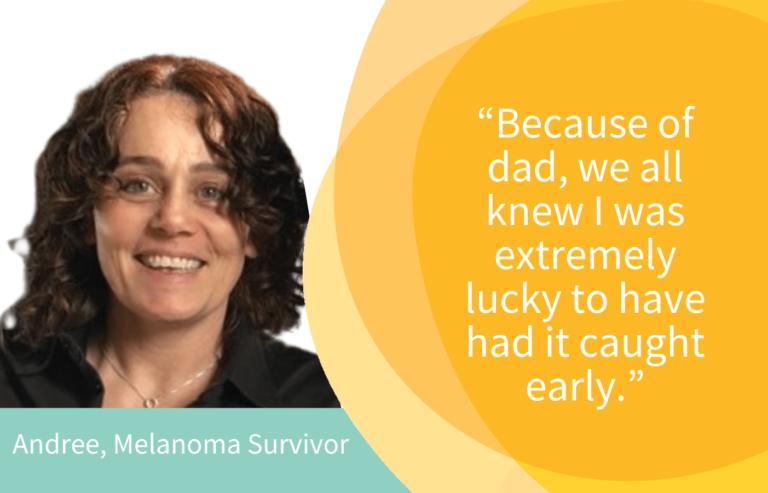With her naturally red hair and fair skin, Andree has always considered herself a “prime candidate” for melanoma and skin cancer.
“I’ve always been sun safe: I apply sunscreen every morning as part of my daily routine, even during winter,” Andree says.
Despite her vigilance towards sun protection, Andree was diagnosed with melanoma in early 2018, while she was living in New York.

Alarm Bells Start Ringing
“It was the middle of winter and I had just bought a new polo neck jumper to help keep me warm. The jumper was rubbing against a mole on the back of my neck that I’d never noticed before.”
This unfamiliar mole set off alarm bells for Andree.
“Fortunately, I’d had some photos taken of the area previously, so I knew that it hadn’t always been there.”
Saved By A Photograph
These photos were taken more than 10 years ago at Armadale Dermatology in Melbourne during one of Andree’s annual skin checkups.
Total Body Photography (TBP) uses digital dermoscopy to take close-up images of the whole skin surface, so any changes can be accurately monitored.
This method, which Andree credits for saving her life, sits at the heart of MASC Trials’ IMAGE clinical trial.
IMAGE is investigating whether TBP should be covered by Medicare to assist in the early detection of melanoma and reduce unnecessary ‘just in case’ biopsies.
After consulting the photographs, Andree’s dermatologist was able to identify and biopsy two new moles on her body.
A couple of weeks after the biopsy, Andree received the devastating results; while the mole on her neck was benign, the mole on her shoulder blade was a melanoma. The good news, Andree had found it early (stage 1) and she received an excellent prognosis.
Navigating a Cancer Diagnosis in a Foreign Country
Andree immediately dived into dealing with the practicalities that come with being diagnosed with melanoma; a daunting task made a lot tougher as she also had to navigate the USA’s health system.
“I had a delayed reaction to the magnitude of the diagnosis and didn’t really begin to process it until several weeks later,” Andree says.
Andree underwent surgery to have a wide area of skin on her shoulder blade excised. After a number of follow up appointments with specialists, Andree decided to leave New York to return to Australia – a decision hastened by her diagnosis among other factors.
Early Detection is Key
Sadly, Andree had lost her father two years earlier to melanoma making her diagnosis hit very close to home for her family.
“I immediately called all my siblings in Australia and recommended that they go and get their skin checked,” Andree says.
“Because of dad, we all knew I was extremely lucky to have caught it early.”
Three years on since her diagnosis, Andree has become the go-to expert on unusual moles.
“My friends often ask me if I think certain moles on their body look suspicious,” Andree says.
“I always tell them to go and get it checked, if for no other reason than peace of mind.”
For Andree, early detection meant a better prognosis and less invasive treatment.
“I feel incredibly fortunate that I received an early diagnosis and am able to access Total Body Photography alongside such good medical care. The overwhelming feeling for me is one of gratitude,” she said.
Even with good fortune on her side, Andree continues to have regular skin check-ups with a dermatologist and monitors her own skin for any changes.
Andree currently works for a green tech software company in Melbourne. She enjoys an active social life, catching up with friends and family at restaurants, theatre shows and gigs (when COVID restrictions allow, that is).
Thank you to Andree for generously sharing her story with MASC Trials. If you’d like to share your own story, we’d love to hear from you.
About MASC Trials’ IMAGE Clinical Trial
Melanoma surveillance using Total Body Photography (TBP) is not currently subsidised by Medicare. The IMAGE trial, led by A/Prof. Victoria Mar, aims to produce the evidence required by the Medical Services Advisory Committee to determine whether TBP should be reimbursed by Medicare.
A/Prof Victoria Mar is the Director of the Victorian Melanoma Service at The Alfred, Adjunct Professor at the School of Public Health and Preventive Medicine, Monash University and a Director of MASC Trials.
The IMAGE trial is sponsored by Monash University and coordinated by the Melanoma and Skin Cancer Research Centre.

